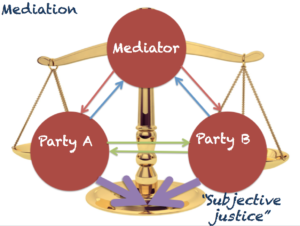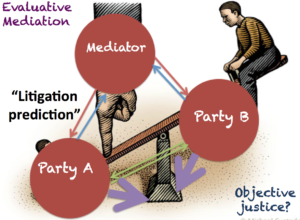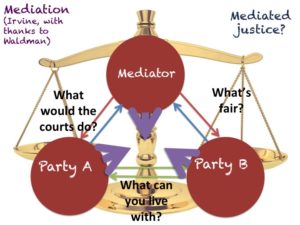Have you ever wondered who mediators are helping? The parties, obviously! Well, not so obvious to our critics. In this blog I consider worries about mediation’s approach to manifest injustice before making the case for understanding the mediator as co-creator, with the parties, of outcomes. I argue that co-creation enhances the prospects for justice.
Stories
Academic critics often express their concerns about mediation via stories. We know how stories go: powerless and friendless victim comes up against confident and remorseless villain. Victim is crushed. Hero appears. Hero takes up victim’s cause, ensures victory and humiliates the villain. And so with tales of mediation. The so-called ‘weaker’ party (female, poor, from an ethnic minority) comes up against a powerful company (with wealthy, white, male lawyers). The mediator appears. If she fails to act heroically, championing the cause of the weak, the critics accuse her of injustice. If the mediator steps in to even the scales, she’s accused of partiality.
I’m tiring of these two-dimensional representations. For one thing they patronise women, minorities and the poor. By assuming these groups need special assistance this stereotype underestimates people’s capacity to take advantage of mediation’s qualities: the valuing of everyday speech, the patience to hear the whole story, the tolerance of emotion.[1]In tribute to Ken Kressel’s remark that ‘all mediation is local’ I acknowledge that these qualities are not present in every mediation. It is often the apparently powerful party, perhaps a middle manager or representative, who expresses discomfort at confrontation. For a nice debunking of the myth of the powerless female see Andrea Schneider’s excellent Ted talk ‘Women don’t Negotiate and Other Similar Nonsense‘
Furthermore, these rhetorical tales simplify complexity. In real life mediation, “everybody’s story makes sense to them.” That doesn’t make them right, but they almost certainly believe they have good reasons for their actions. Why would managers, directors or lawyers want to take part in a process that ignores or slaps down their thinking? Their stories need to be heard too, not only for fairness but to let the other party glimpse the logic driving the dispute.
In fact mediators often face the opposite problem: over-optimism. The ‘weaker’ party’s lack of knowledge about legal norms can lead them to believe they are entitled to much more than courts or tribunals will award. How then should a mediator behave? If they uncritically champion this position they do that party a disservice, missing potential settlements and pissing off the other side. Even so-called neutrality has the same effect. A voice inside my head says: “If I go home knowing that this party will never get anywhere near the £X,000 they seek, and keep that knowledge to myself, whose interests am I serving?” So, ironically, a mediator may work to reduce the aspirations of the less powerful party in that person’s interests.
Real-life research
To return to my question, who then are we helping? If we don’t extend equal support and regard to both parties, why would they trust us? This goes to the heart of mediator ethics. In whose interests do we act? The parties? The justice system? The State? Our own?
Recent Australian research sheds some light on mediators’ answers to these questions [2]Noone MA and Ojelabi LA, ‘Ethical Challenges for Mediators around the Globe: An Australian Perspective’ (2014) 45 Washington University Journal of Law & Policy 145. Inspired by Ellen Waldman’s excellent volume on Mediation Ethics [3]Waldman EA, Mediation Ethics: Cases and Commentaries. San Francisco: Jossey-Bass, 2011 the researchers presented employment mediators with a scenario seemingly designed to tempt them into heroic intervention.[4]A sexual harassment claim by a 23 year old female against her boss where the company arrives mob-handed (boss, HR, two directors and two lawyers) while the claimant has one not-terribly-impressive … Continue reading Then they posed some tricky questions about how the mediators might act. Their conclusions won’t come as a huge surprise to practitioners. Mediators were keen on informed decision-making and procedural fairness but more cautious about substantive justice. Most saw that as the parties’ own business. I was relieved to read that, despite a shared enthusiasm for self-determination, ‘mediators have individual moral compasses’.[5]Ojelabi and Noone 2014, p. 147 The impression was of experienced and thoughtful practitioners wrestling with questions to which there is no simple answer.
Models: Facilitative, Evaluative and Mediator as Co-creator
Conventional models of mediation don’t quite capture what’s going on. The classic ‘facilitative’ presentation of the process has the mediator as a kind of well-intentioned conduit for parties’ messages:
What is the mediator actually providing here? A setting? A process? A witness? A message bearer? The notion that the outcome comes entirely from the parties is almost sacerdotal in the facilitative mediation canon. And because the result is attributed to ‘lay’ people, the justice it produces is seen as subjective.
Evaluative mediators have no such squeamishness about their influence, claiming to enhance informed decision-making by providing expert predictions about the courts’ likely behaviour:
Here the mediator provides normative guidance of a specific kind.[6]corresponding to Riskin’s “evaluative/narrow” style: Riskin LL, ‘Understanding Mediators’ Orientations, Strategies, and Techniques: A Grid for the Perplexed’ (1996) 1 Harvard … Continue reading She may act as reality tester, confidante, message bearer and influencer, but most would still see the parties (or their lawyers) as decision-makers. As most evaluative mediators appear to be legally qualified the justice produced is seen as objective.
If we were starting from scratch we might approach things differently. My own experience and studies by too many scholars to name in a blog[7]For a small selection see Wall J a and Dunne TC, ‘State of the Art Mediation Research : A Current Review’ (2012) Negotiation Journal 217; Greatbatch D and Dingwall R, ‘Selective Facilitation: … Continue reading have convinced me that mediators (mostly) co-create outcomes. This doesn’t mean supplanting the parties, as in James Alfini’s nightmare vision.[8]Alfini JJ, ‘Trashing, Bashing, and Hashing It out: Is This the End Of “Good Mediation”?’ (1991) 19 Florida State University Law Review 47 Rather it means acknowledging the complexity of mediation as a system. If we are there, we have an influence.[9]Wheatley, MJ, Leadership and the New Science: Discovering Order in a Chaotic World. San Francisco: Berret-Koehler, 2006
I’m not suggesting that party self-determination plays no part. I’ve always found it a merciful discipline that parties have the ultimate veto in my work. It ain’t over till they say it is. But most of our clients, most of the time, welcome a well-intentioned other who has the patience and persistence to probe, test, suggest, craft and hone until something appears. Far from being apologetic about our impact I’m coming to believe we should celebrate it. The doctrine of neutrality, borrowed from judges, needs to be returned to the courts. Not only does it confuse parties (do you care about us or not?) but it confuses mediators. Again and again I hear new mediators describe some party misperception as a block to resolution. When asked if they said what they were thinking they answer “But I didn’t think we were allowed to say that.”
A more plausible model of practice would look like this:
The mediator as co-creator does the same things as in the classic models – questions, summarises, reality-tests, gets alongside the parties and sees things from their perspective – but acknowledges his influence. Things said and not said all impact the result. Mediator and parties keep negotiating not only about the outcome but about the criteria by which it is to be evaluated.
Let me be clear: co-creation is not evaluation. The mediator’s input is held lightly, open to negotiation, rejection and modification. What we are really doing is assisting people to forge their own vision of justice. No-one suggests law and justice are identical. Most people know what is just; why shouldn’t they know what justice is? If we respect people enough to give them a say in the justice of their own cause we may find that we gain more than we lose.
________________________
To make sure you do not miss out on regular updates from the Kluwer Mediation Blog, please subscribe here.

References





This is a really useful analysis Charlie. It provides a useful description of a third way which breaks the binary evaluative/facultative polarity.
Thanks John. Appreciate it.
Hello Charlie, I enjoyed your article, I´m a mediator in Mexico and would very much like to use the image you borrowed from EA Waldman for a small article in LinkedIn, and I cannot seem to find the way to contact him to seek permission. Could I trouble you for some contact information? Gracias!
Hi Luis,
Thanks for your message. Actually the image is mine but I credit Ellen Waldman because of her thinking in the book on mediation ethics that I cited in the blog. She sees ‘norm educating’ or ‘norm advocating’ by mediators as a respectable tradition.
You are certainly welcome to use the image. Ellen can be contacted through her law school, Thomas Jefferson in San Diego.
Kind regards
Charlie